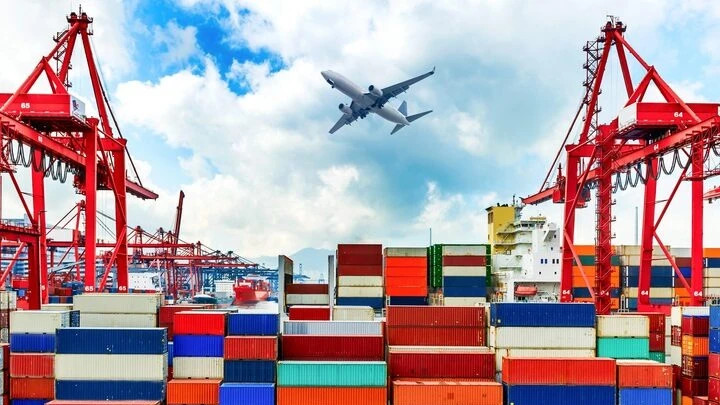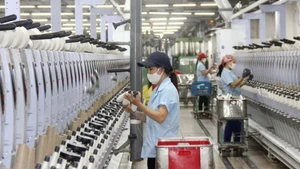In recent days, the Vietnamese economy has been "unsteadily" following the complicated developments of US trade policy. Information about President Donald Trump's decision to impose reciprocal taxes on a series of countries, including Vietnam,in spite of postponed for 90 days and reduced to an expected tax rate of 10%, still rings the alarm about potential negative impacts.
“Pincers” of tariffs cause great disturbance
The temporary suspension provides a valuable “breathing space” for Vietnam to negotiate, but the uncertainty about the final tariff rate, as well as the possibility of this policy returning after 90 days, requires Vietnam to have careful assessments and preparations for the worst-case scenarios.
Concerns about the impact of US tariffs on the Vietnamese economy are not unfounded. Recently, UOB Bank has adjusted its forecast for Vietnam’s GDP growth this year down to 6%, instead of the previous forecast 7%, mainly due to the risks and pressure from US tariff policy.
Therefore, it is extremely necessary for Vietnam to simultaneously review its domestic special consumption tax policy, especially the roadmap and the targeted increase rate. According to analysis from experts and feedback from businesses, the sudden increase in tariff pressure will significantly erode profits, even pushing many businesses into losses.
The obvious lessons from previous tax impositions have clearly shown this. Businesses must struggle to find ways to cope, from cutting production costs, finding alternative sources of raw materials, to downsizing operational scale. In the context of increasingly fierce international competition, increasing product prices to offset tariff costs can cause Vietnamese goods to lose their competitive advantage, leading to a decrease in orders and market share.
The consequences do not stop at businesses. When production and business activities stagnate or shrink, employees will be directly affected. Cuts to staff, reduction of working hours, or even closure of factories can lead to increased unemployment.
According to statistics, export industries to the US, such as electronics, machinery, textiles, footwear and wooden furniture, create a large number of jobs for Vietnamese people. The "shock" from the US tariff policy could cause major disturbances in the labour market, increasing the burden on social security.
In the context of tariff disadvantages, another worrying trend is that businesses, especially foreign-invested enterprises, will consider shifting production to other countries in the region with more preferential tax rates.
Vietnam used to be an attractive destination thanks to its competitive production costs and investment attraction policies. However, a sudden change in the tariff policy of a major trading partner like the US can change this balance of advantages.
The shift of production by enterprises not only reduces budget revenue from taxes and related economic activities, but also directly affects the disposable income of the entire economy. When factories close and workers lose their jobs, the economy's aggregate demand will decline, leading to a decline in consumption and investment. A spiral of economic decline can form if there are no timely and effective response measures.
In the context of affected income, people will tend to tighten spending, especially on non-essential goods. However, for addictive products such as cigarettes, consumption demand is unlikely to decrease immediately. Instead of buying branded and fully taxed products, consumers will tend to buy smuggled tobacco with cheaper prices and unknown origins. This not only causes a loss of state budget revenue but also increases smuggling, destabilises the market and affects public health.
Roadmap and rates of special consumption tax increase need to be considered
The goal of increasing special consumption tax is often to increase budget revenue and limit consumption of discouraged products. However, the timing and level of tax increase need to be carefully considered, especially in the context of many macroeconomic fluctuations.
For example, on beer and wine, increasing tax can reduce the competitiveness of domestic enterprises compared to imported goods, as well as affect tourism activities and related services. For pickup trucks, this is a means of transport serving many different economic sectors, especially in rural areas and the construction and transportation industries. Increasing taxes can increase input costs for these industries, affecting the overall competitiveness of the economy.
 |
| Pickup trucks are a means of transport serving many economic sectors, especially the construction and transportation industries, increasing taxes can increase input costs for these industries. |
Similar with tobacco products, the sudden and excessive tax increase as in the current amendment draft of the Law on Special Consumption Tax, along with the trend of tightening consumers’ spending due to the impact of the US tariffs as analysed above, will further push consumers to use smuggled products, further stimulating illegal tobacco trading, which has long been a burning issue in Vietnam.
Smuggled tobacco not only causes loss of state budget revenue, but also does not ensure quality, is many times more harmful to consumers' health and causes difficulties for legal tobacco manufacturing enterprises. The sudden and excessive increase in special consumption tax further increases the price gap with legal tobacco, creating huge profits for smugglers, causing far-reaching consequences for security and social order.
At the same time, the livelihoods of tens of thousands of farming households in many raw material growing areas across the country are also negatively affected. As legal tobacco output declines due to taxes and smuggled tobacco, the demand for tobacco leaves also declines. This leads to a decrease in tobacco leaf output and purchase price while threatening the stability of specialised economic zones, thus affecting social security and rural development programs.
In the context of Vietnam's economy facing significant challenges from US trade policy, maintaining domestic economic stability becomes extremely important. The double-digit economic growth target set by the government can be affected by both external factors (US tariffs) and internal factors (domestic special consumption tax policy). The current plan to increase special consumption taxes for the alcohol, tobacco, sugary soft drinks and automobile industries all have high increases and a shocking increase roadmap.
 |
| The current plan to increase special consumption taxes for the alcohol, tobacco, sugary soft drinks and automobile industries all have high rates of increase and a shocking increase roadmap. |
Therefore, economic experts recommend that management agencies proactively plan and prepare for the worst scenario. Reviewing and adjusting domestic financial policies, especially the special consumption tax policy, is completely within control. At the session in May 2025, the National Assembly will pass the Law on Special Consumption Tax and if the current proposal is still approved, it will create serious consequences for the manufacturing industry of these special consumption taxable items.
Therefore, tax rates and increase roadmaps need to be carefully considered to have reasonable rates and roadmaps, avoiding the creation of a "double shock" for businesses and affecting the economic development goals of the Party and state. Stabilising domestic tax policies, considering extending the roadmap and reducing tax increases are considered timely solutions by experts.
A stable domestic tax policy will help businesses have more time and resources to respond to external fluctuations and protect jobs for employees. At the same time, authorities need to continue to make efforts in international dialogue and negotiation to minimise the negative impacts of trade partners' tariff policies.
In the context of the stalking "tariff storm", prudence and flexibility in managing macroeconomic policies, especially domestic tax policies, will play a key role in maintaining stability and developing sustainably the economy.
















